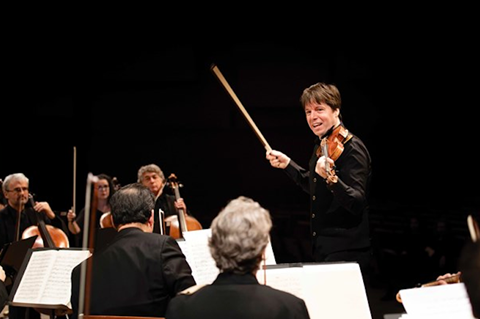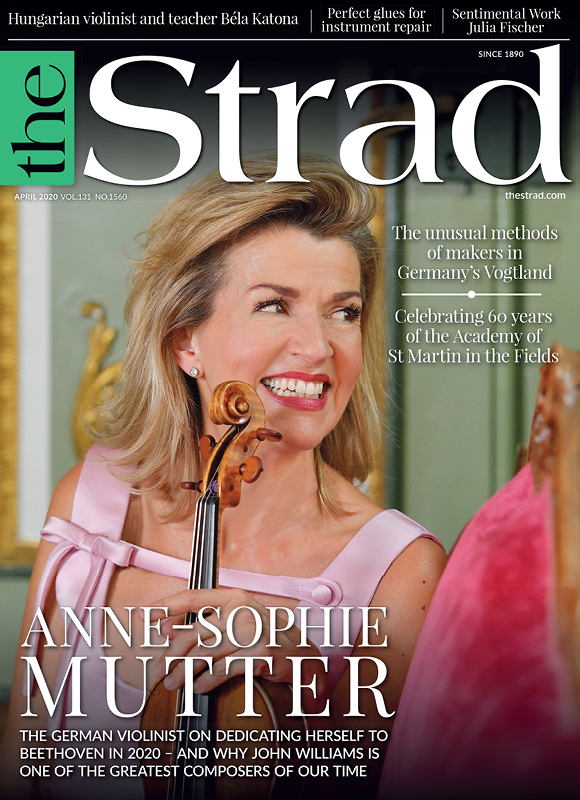The Academy of St Martin in the Fields celebrates its 60th anniversary this season with a 60-CD box set of its celebrated recordings, and tours to Europe and the US. Toby Deller speaks to some of the orchestra’s long-standing string players about the experience of playing under their current music director Joshua Bell

This is an extract from a longer article in our April 2020 issue. To read in full, click here to subscribe and login. The April 2020 digital magazine and print edition are on sale now.
Miranda Playfair, a violinist with ASMF, brings up an often-contentious subject among players with strongly held preferences reflecting their training or inherited practices. ‘Has anyone talked about bowings? Because Josh has a really unique take on bowings. Isn’t that true?’ When her comments meet with protest, she retorts, ‘Oh, come on! He does have a truly unique approach to bowings. At the beginning, when we did Beethoven symphonies, everything felt upside down. In the first violins we were all over the shop because we couldn’t keep up with his shifts and bowings: passages we were used to hooking were no longer hooked, or if we had been playing down–up, we would now be playing up–down. He loves making things challenging and uncomfortable to give them energy. I learnt a lot from that. There is no bad bowing – it’s about keeping alert all the time. I think that’s changed the way we’ve played, a lot, as we’re never too comfortable.’
- Read: Academy of St Martin in the Fields at 60: One Big Family
- Read: Joshua Bell extends Academy of St Martin in the Fields contract until 2023
- Watch: Sir Neville Marriner conducts Academy of St Martin in the Fields aged 90
principal first violin Harvey de Souza, who joined the orchestra in 1993, agrees, but also highlights the tendency of string players in general to become obsessed with matters of orthodoxy when it comes to bowing: ‘I hate bowings; I absolutely detest them! I do feel our job is to be a blank sheet. We should be able to play with an up or a down bow, or standing on our head if the music requires it. We get so locked into it. For 30 years something has been a down bow and that’s all you’ve known. Then suddenly someone comes along and says, “Let’s do an up bow,” and then all hell breaks loose! It shouldn’t be like that. Josh is very much from that school of thought. He’ll change things on a whim. Suddenly, it’ll sound better and he’ll say, “Why don’t we do it this way?”’
It’s an approach that Playfair finds rewarding, even if it was not to everyone’s taste at first. ‘Playing with Josh is utterly liberating because he doesn’t ever put a cap on how much you can give. When you’re throwing yourself at some of the sections in a Beethoven symphony, there is no limit. That’s fantastic, that’s what Beethoven would have wanted and it’s what most orchestras don’t allow you to do because there has to be an element of polish. Sometimes that’s not the right way and I feel like Josh gets that. He’s got that intuitive feel for where the boundaries are and when you shouldn’t have any boundaries at all.’
This is an extract from a longer article in our April 2020 issue, in which Toby Deller speaks to some of the orchestra’s long-standing string players about working together democratically and the artistic transition from founder Neville Marriner to current music director Joshua Bell. To read in full, click here to subscribe and login. The April 2020 digital magazine and print edition are on sale now.
-
This article was published in the April 2020 Anne-Sophie Mutter issue
The German violinist discusses dedicating herself to Beethoven in 2020 - and why John Williams is one of the greatest composers of our time. Explore all the articles in this issue.
More from this issue…
- Anne-Sophie Mutter on Beethoven and John Williams
- Lutherie in 18th-century eastern Germany
- The Academy of St Martin in the Fields at 60
- The instruments of Pöpel and Kurzendörffer
- The great Hungarian string teacher Béla Katona
Read more playing content here
-




































No comments yet